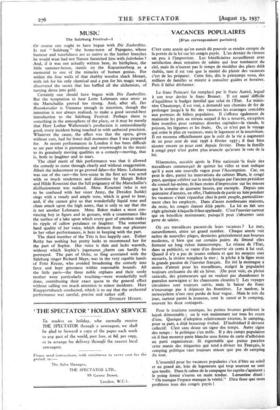MUSIC The Salzburg Festival—I OF course one ought to have
begun with Die Zauberflote. Is not " Soisburg " the home-town of Papageno, whose humour and tunefulness are as native as the leather breeches he would wear had not Nature furnished him with federho;en ? And, if it was not actually written here, its birthplace, the little summer-house, stands on the Kapuzinerberg as a memorial to one of the miracles of human genius. For within the four walls of that shabby wooden shack Mozart, with ink for his only chemical and a pen for his magic wand, discovered the secret that has baffled all the alchemists, of turning dross into gold.
Certainly one should have begun with Die Zauberflote. But the temptation to hear Lotte Lehmann once more as the Marschallin proved too strong. And, after all, Der Rosenkavalier is Viennese enough in intention, though the intention is not always realised, to make a good second-best introduction to the Salzburg Festival. Perhaps there is something in the atmosphere of the place, or it may be merely that Herr Lothar Wallerstein's production is extraordinarily good, every incident being touched in with unforced precision. Whatever the cause, the effect was that the opera, given without cuts, had far fewer dull moments than I was prepared for. At recent performances in London it has been difficult to see past what is pretentious and overwrought in the music to its genuinely moving qualities as a comedy—moving, that is, both to laughter and to tears.
The chief merit of this performance was that it allowed the comedy to come through clearly and without exaggeration. Albeit the inducement to go proved false—for Mme. Lehmann was out of the cast—the love-scene in the first act was acted with so much tenderness and discretion by Margit Bokor and Hilde Konetzni that the full poignancy of the Marschallin's disillusionment was realised. Mme. Konetzni (who is not to be confused with her sister Army, the Dresden Isolde) sings with a steady and ample tone, which is good to hear, and, if she cannot give us that wonderfully liquid tone and clean attack upon the high notes, that is only to say that she is not another Lehmann. Mine. Bokor makes a most con- vincing boy in figure and in gesture, with a countenance like the surface of a lake upon which every gust of emotion makes its ripple of callow petulance or laughter. The somewhat hard quality of her voice, which detracts from our pleasure in her other performances, is here in keeping with the part.
The third member of the Trio is less happily cast. Esther
Rethy has nothing but pretty looks to recommend her for the part of Sophie. Her voice is thin and lacks warmth, without which Sophie's ingenuous (charm can hardly be portrayed. The part of Ochs, so long associated with the Salzburg singer Richard Mayr, was in the very capable hands of Fritz Krenn, who avoided broadening the comedy into farce and kept grossness within reasonable bounds. All the little parts—the three noble orphans and their seedy mother were particularly touching—were wonderfully well done, contributing their exact quota to the general effect without calling too much attention to minor incidents. Herr Knappertsbusch conducted, which is to say that the orchestral performance way careful, precise and rather stiff.
DYNELEY HUSSEY.






































 Previous page
Previous page